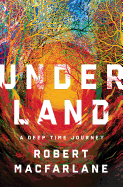
British nature writer Robert Macfarlane has long been intrigued by mountains, forests and wild places. His fifth book, Underland, is in some ways a literal and metaphorical inversion of his previous work. Instead of climbing up, Macfarlane (Landmarks; The Old Ways) goes down, into underworlds both physical and spiritual. He takes readers along as he visits deep mine shafts (abandoned and working), the maze of catacombs under Paris, cavernous spaces created by underground rock formations and ultra-secure facilities intended for the eons-long storage of nuclear waste. His travels take him to remote places in Norway and Slovenia, and he also delves into the reasons humans hide or bury objects, and the potential implications of such burials.
With a keen eye for detail, Macfarlane describes the underlands he visits and explores their complicated histories, which often include "past pain and present beauty." He is awed, fascinated and sometimes unnerved by these landscapes: ancient cave art painted in red; ice hikes across glaciers; the profoundly unsettling effects of human industry and conflict over centuries. Underland draws together forest, glacier, city and mountain, but it also picks up threads of science, religion, mysticism and anthropology. It is Macfarlane's most ambitious work yet: an examination of what human beings hide and why, what the earth itself keeps secret, and the potentially steep price of ignoring both. At once contemplative and urgent, Underland is an eloquent, eerie and compelling journey into dark and fascinating corners of the world. --Katie Noah Gibson, blogger at Cakes, Tea and Dreams

